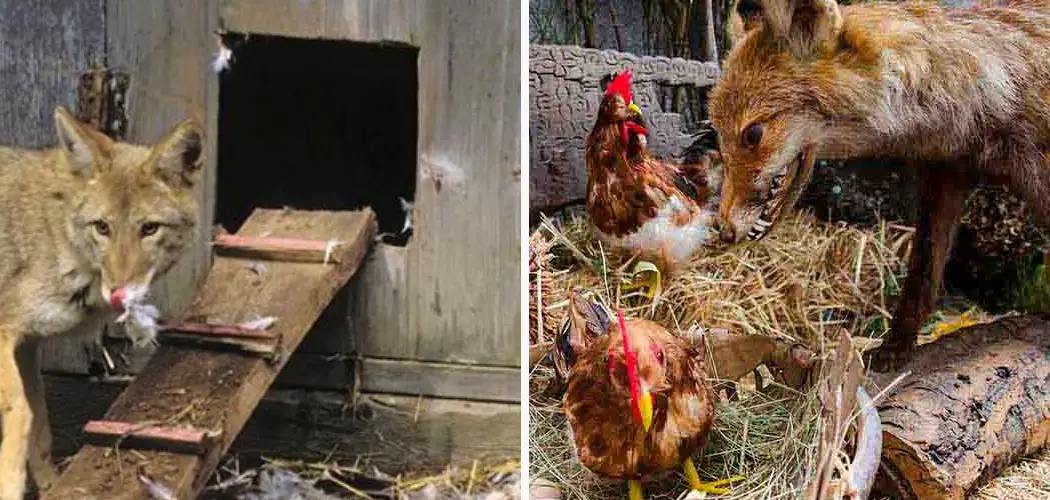There are several reasons why you should keep coyotes away from your chickens. First and foremost, coyotes can be a threat to the well-being of your flock. They are known for killing chickens, especially young or weak birds.
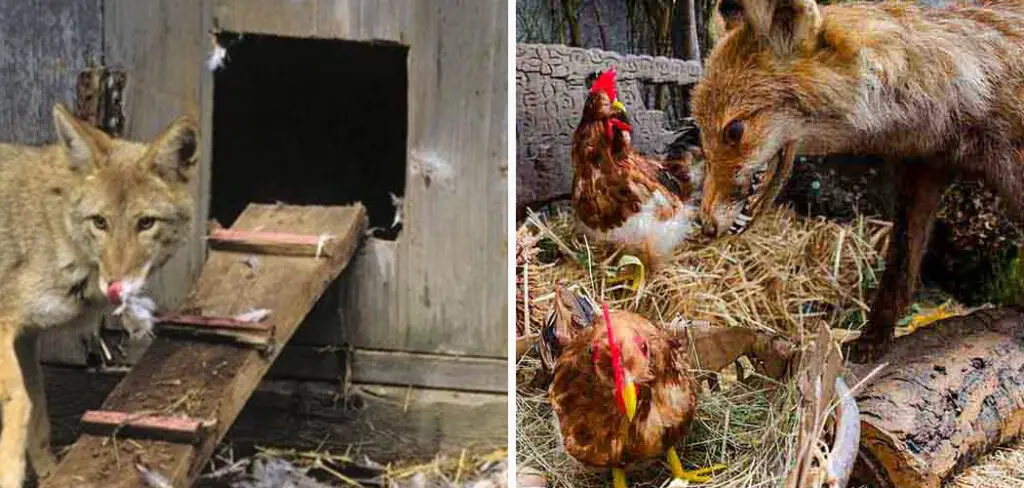
The main advantage of keeping coyotes away from your chickens is to ensure the safety and health of your flock. By implementing methods to keep coyotes at bay, you can prevent potential attacks and minimize stress for your birds. In this blog post, You will learn in detail how to keep coyotes away from chickens.
Step-by-step Instructions for How to Keep Coyotes Away From Chickens
Step 1: Inspect Your Chicken Coop and Perimeter
Before implementing any methods, thoroughly inspect your chicken coop and the surrounding area for potential entry points where coyotes could get in. Make sure your coop is secure with no holes or gaps that could allow coyotes to access your chickens.
Step 2: Install a Fence Around Your Coop
A fence is the most effective way to keep coyotes away from your chickens. You can use chicken wire or hardware cloth to create a sturdy barrier around your coop and run. Dig the fence underground at least 12 inches to prevent coyotes from digging under it.
Coyotes are nocturnal animals, so installing motion-activated lights and sounds can startle them and prevent them from coming near your coop. You can also use a motion-activated sprinkler system to deter coyotes.
Step 3: Keep Your Chickens Safe at Night
Coyotes are most active during the night, so it’s crucial to keep your chickens safely locked up in their coop at night. Make sure the coop is securely latched, and there are no holes or gaps that could allow coyotes to access your birds.
There are several natural repellents you can use to keep coyotes away from your chickens. These include red pepper flakes, predator urine, and human hair scattered around the perimeter of your coop. You can also plant prickly shrubs like holly or rose bushes around your coop to create a physical barrier.
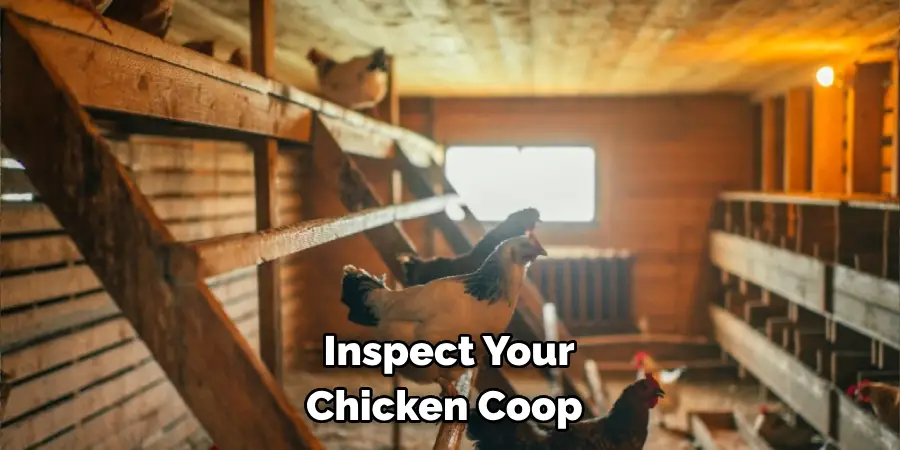
Step 4: Keep Your Chicken Feed Secure
Coyotes are attracted to the smell of chicken feed, so it’s crucial to keep it in a secure container. Make sure there are no spills or leftovers outside the coop that could attract coyotes.
Another effective method for keeping coyotes away from your chickens is to get a guard dog. Breeds like Great Pyrenees, Anatolian Shepherds, and Akbash are known for their protective instincts and can help deter coyotes.
Step 5: Install Motion-Activated Cameras
Installing motion-activated cameras around your coop can help you monitor any potential coyote activity near your flock. It can also help you identify weak spots in your coop’s security.
Trapping coyotes is another method to keep them away from your chickens. Consult with a professional or research local regulations before using traps, and make sure to release the coyotes far away from your property.
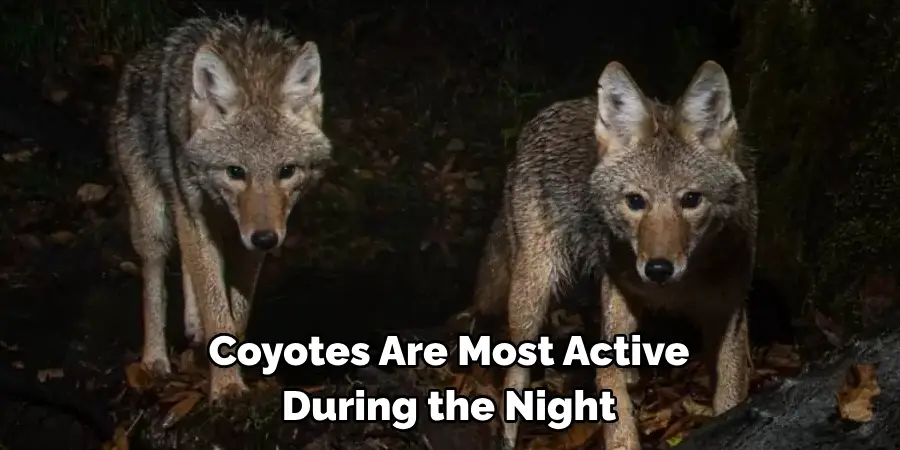
Step 6: Be Vigilant
Finally, the key to keeping coyotes away from your chickens is being vigilant. Regularly check your coop and surrounding area for potential threats, and be proactive in implementing preventive measures.
By following these steps, you can effectively keep coyotes away from your chickens and ensure the safety and well-being of your flock. Remember to always prioritize the safety of your chickens and be proactive in protecting them from predators.
Precautions for How to Keep Coyotes Away From Chickens
- Always lock up your chickens in their coop at night to protect them from potential coyote attacks.
- Keep a close eye on your flock during the day and regularly check for any signs of possible predator activity.
- Implement multiple methods to keep coyotes away, such as fencing, natural repellents, and guard dogs, for added protection.
- Do not leave any food sources or scraps outside the coop that could attract coyotes.
- Consult with a professional or research local regulations before using traps to catch coyotes.
- Keep your coop and surrounding area well-maintained and free of potential entry points for coyotes.
- Be vigilant and proactive in protecting your chickens from predators, as prevention is key in keeping them safe. So, always be on the lookout for potential threats and take necessary precautions to keep coyotes away from your chickens.

What Are Some Signs to Look Out for That Indicate Coyotes Are in the Area?
As humans continue to encroach on natural habitats, the chances of encountering coyotes have increased. These wild animals are adaptable and can thrive in a variety of urban and suburban environments. While they are generally shy and avoid human contact, there are some instances where coyotes may come into close proximity with people. As such, it is important to be aware of signs that indicate coyotes may be in the area. Here are some things to look out for:
- Coyote Tracks: One of the most obvious signs that coyotes are present in an area is their tracks. These can often be found near water sources, on trails, or even in residential areas. Coyote tracks resemble those of a small dog, but with longer claws and a more pointed appearance.
- Howling or Yipping: If you hear high-pitched howls or yips coming from the distance, it is likely that coyotes are communicating with each other. This is especially common during their breeding season in early spring and fall.
- Scat: Coyote droppings can provide valuable clues about their presence in an area. The scat is typically small and filled with hair, bones, and vegetation. It may also have a distinct musky odor.
- Dead Animals: Coyotes are opportunistic hunters and will prey on small animals such as rabbits, rodents, and even domestic pets. If you come across the remains of a dead animal in your neighborhood or local park, it could be a sign that coyotes are in the area.
- Missing Pets: If your pet suddenly goes missing, it could be a sign that coyotes have been active in your area. Keep an eye out for any unusual behavior from other animals as well, such as neighborhood cats or dogs acting skittish or scared.
- Changes in Behavior of Wildlife: If you notice that birds and small mammals are no longer active in your area, it could be a sign that coyotes are present. These animals may avoid areas where they feel threatened by predators.
- Vocalizations: In addition to howling and yipping, coyotes also make other vocalizations such as growling, barking, and whining. These can often be heard at night and may indicate the presence of coyotes nearby.
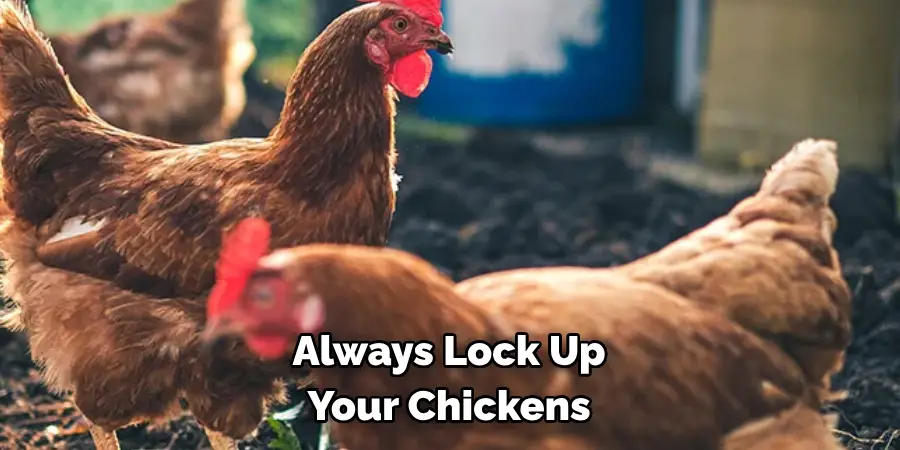
If you do encounter a coyote, it is important to remember that they are wild animals and should be treated with caution. Keep your distance and do not approach or feed them. It is also important to avoid leaving food sources outside, as this can attract coyotes looking for an easy meal.
How Can You Protect Your Chickens From Coyotes at Night?
Coyotes are one of the biggest threats to backyard chickens at night. These clever predators can easily jump or dig under fences, and have been known to snatch chickens while they sleep. However, there are several steps you can take to protect your chickens from coyotes at night.
1. Secure Your Coop
The first line of defense against coyotes is a secure coop. Make sure that your coop is sturdy and free from any holes or weak spots where a coyote could potentially enter. You can also reinforce the bottom of the coop with hardware cloth to prevent coyotes from digging under it.
2. Install Predator-Proof Fencing
In addition to securing your coop, you should also install predator-proof fencing around your entire chicken yard. This means using fencing with small gaps or holes that coyotes can’t fit through. The fence should also be at least six feet tall to prevent coyotes from jumping over it.
3. Use Motion-Activated Lights
Coyotes are nocturnal animals, so they are most active at night. Installing motion-activated lights around your chicken yard can help scare them away. When a coyote approaches, the sudden bright light can startle them and deter them from coming any closer.
4. Get a Guard Dog
Another effective way to protect your chickens from coyotes at night is by getting a guard dog. Breeds such as Great Pyrenees or Anatolian Shepherds are natural protectors and will alert you to any potential threats. However, make sure to properly train and socialize your guard dog to prevent any accidents.
5. Keep Your Chickens Locked Up at Night
One of the simplest ways to keep your chickens safe from coyotes at night is by keeping them locked up in their coop. Coyotes are opportunistic predators, so if they can’t easily access your chickens, they will likely move on to easier prey. Make sure to close and secure all coop doors once your chickens have gone inside for the night.
6. Use Coyote Deterrents
There are several coyote deterrents available on the market that can help protect your chickens at night. These include motion-activated sprinklers, noise-makers, and even predator urine spray. While these may not be 100% effective, they can help make your chicken yard less appealing to coyotes.
7. Be Vigilant
The best way to protect your chickens from coyotes at night is by being vigilant. Keep an eye out for any signs of a coyote near your property, such as tracks or scat. If possible, try to make loud noises or shine bright lights to scare them away before they get close to your chickens.
Coyotes can pose a serious threat to backyard chickens, especially at night. However, by taking proper precautions such as securing your coop, installing predator-proof fencing, and using deterrents, you can greatly reduce the risk of a coyote attack.
How Important is It to Secure Your Chicken Coop and Run When Trying to Keep Coyotes Away?
Coyotes are a common predator that can pose a threat to backyard chickens. These intelligent and opportunistic animals tend to target smaller prey, making them a significant concern for chicken owners. While there are various methods to deter coyotes from your property, one crucial aspect that should not be overlooked is securing your chicken coop and run. Not only do coyotes pose a danger to your chickens, but they can also attract other predators such as raccoons and foxes. Additionally, a poorly secured chicken coop can also make it easier for opportunistic birds like hawks and owls to attack your flock.

To ensure the safety of your chickens, it is essential to secure your chicken coop and run in several ways. The first step is to make sure your coop is predator-proof. This means using sturdy materials and construction techniques to prevent any potential entry points for coyotes or other predators.
Consider reinforcing doors, windows, and vents with hardware cloth or small-gauge wire mesh. Another crucial aspect of securing your chicken coop and run is to have a solid perimeter fence. This can be in the form of a physical barrier such as a wooden or wire fence, or even an invisible electric fence. The height and strength of the fence should be enough to prevent coyotes from jumping over or digging under it.
Are There Any Specific Breeds of Chickens That Are More Resilient Against Coyote Attacks?
There is no breed of chicken that can be considered completely resistant to coyote attacks, as it largely depends on the individual coyote and its hunting abilities. However, there are some breeds that have been reported to be more resilient against these predators. One such breed is the Rhode Island Red. This popular breed is known for its large size and feisty temperament, making it a less desirable target for coyotes.
Additionally, their deep red coloration can camouflage them in the surrounding environment, making it harder for predators to spot them.
Another breed that has been reported to have some resilience against coyotes is the Dominique. These chickens are known for being very alert and aware of their surroundings, and will often sound a loud alarm when they sense danger.
This can be a deterrent for coyotes, as their loud clucking and flapping can alert other chickens in the area to potential danger. Silkie chickens are another breed that has been known to survive coyote attacks. These fluffy birds may not seem like they would be able to defend themselves, but their feathers actually have a thick layer of down underneath, making it harder for predators to get a good grip on them.
How Often Should You Check for Any Potential Breaches or Weaknesses in Your Chicken Coop and Run?
When it comes to the safety and security of your chickens, regular checks for potential breaches or weaknesses in your chicken coop and run are essential. Not only do these checks ensure that your chickens are protected from predators, but they also help maintain the structural integrity of your coop and run.
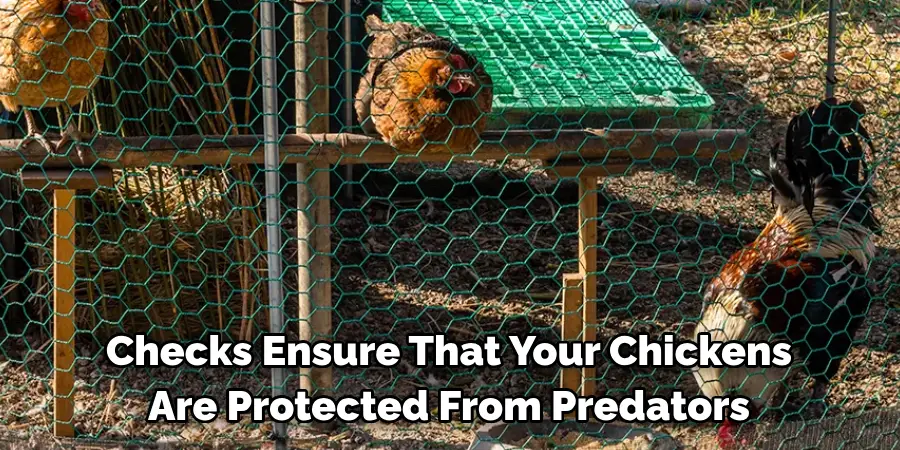
1. Regular Checks
Regularly checking for any potential breaches or weaknesses in your chicken coop and run should be part of your routine maintenance tasks. This includes daily, weekly, and monthly checks to ensure that everything is in order.
2. Daily Checks
On a daily basis, you should do a quick visual inspection of your chicken coop and run. Look for any signs of damage or wear and tear that could compromise the security of your chickens. This includes checking for loose wires or holes in the fencing, damaged doors or latches, and any potential entry points for predators such as gaps or cracks.
3. Weekly Checks
In addition to daily checks, it’s important to do a more thorough inspection of your chicken coop and run on a weekly basis. This could involve checking the stability of the structure, tightening any loose screws or bolts, and examining the flooring for signs of wear and tear. It’s also a good idea to check for any signs of pests or parasites that could potentially harm your chickens.
4. Monthly Checks
Once a month, it’s important to do a more in-depth inspection of your chicken coop and run. This could involve checking the integrity of the walls and roof, as well as inspecting the ventilation systems and cleaning out any accumulated debris. You should also take this time to assess if any repairs or upgrades are needed to maintain the safety and comfort of your chickens.
5. Seasonal Checks
In addition to daily, weekly, and monthly checks, it’s also crucial to do seasonal checks for potential breaches or weaknesses in your chicken coop and run. This could involve checking for any damage caused by severe weather conditions such as strong winds or heavy rainfall. It’s also a good opportunity to make any necessary repairs or upgrades before the start of a new season.
By incorporating these checks into your routine maintenance tasks, you can ensure that your coop and run remain secure and functional, providing a safe home for your chickens. Remember, prevention is always better than dealing with a potential breach or weakness after it has already occurred.
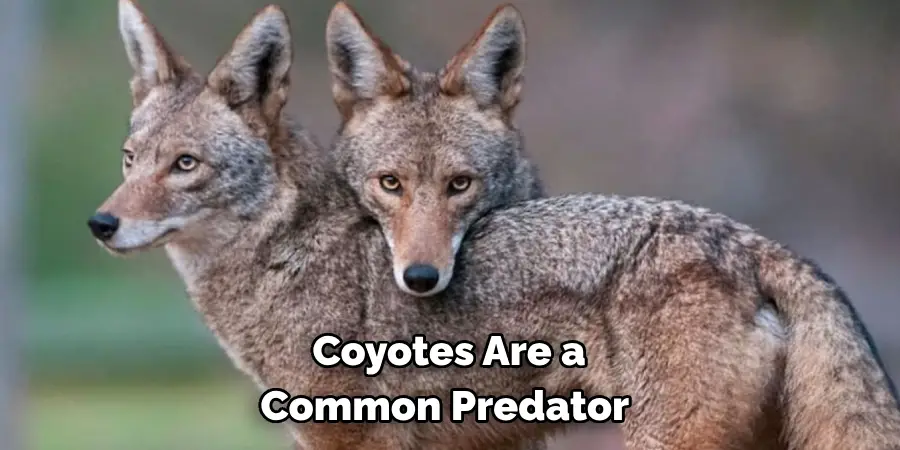
Conclusion
In conclusion, protecting chickens from coyotes is an important aspect of successful chicken ownership. These predators can pose a serious threat to the well-being and safety of your flock, so it’s crucial to take preventative measures against them. One effective way to keep coyotes away from chickens is by building a sturdy and secure coop or enclosure.
This will not only protect your chickens from potential attacks, but it will also provide them with a safe and comfortable living environment. Another helpful tip is to avoid leaving food sources out in the open, as this can attract coyotes and other predators to your property. Instead, feed your chickens in their secure enclosure or coop, and make sure to properly dispose of any leftover food. I hope reading this post has helped you learn how to keep coyotes away from chickens. Make sure the safety precautions are carried out in the order listed.
About
Outdoor Fixes is a distinguished figure in the world of Diy design, with a decade of expertise creating innovative and sustainable Diy solutions.
His professional focus lies in merging traditional craftsmanship with modern manufacturing techniques,
fostering designs that are both practical and environmentally conscious. As the author of diy,
outdoorfixes delves into the art and science of outdoorfixes-making, inspiring artisans and industry professionals alike.
Education RMIT University
(Melbourne, Australia) Associate Degree in Design (Outdoor Fixes) Focus on sustainable design, industry-driven projects,
and practical craftsmanship. Gained hands-on experience with traditional and digital manufacturing tools, such as CAD and CNC software.
Nottingham Trent University
(United Kingdom) Bachelor’s in outdoorfixes.com and Product Design (Honors) Specialized in product design with a focus on blending creativity with production
techniques. Participated in industry projects, working with companies like John Lewis and Vitsoe to gain real-world insights.
Publications and Impact
In diy, Outdoor Fixes his insights on indoor design processes, materials, and strategies for efficient production.
His writing bridges the gap between artisan knowledge and modern industry needs, making it a must-read for both budding designers and seasoned professionals.

